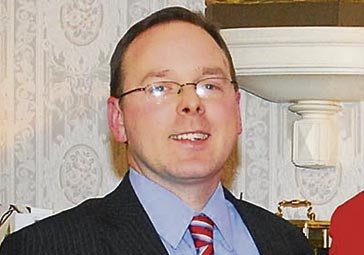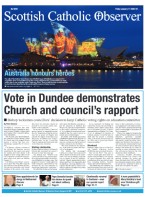BY Ian Dunn | December 2 | ![]() 0 COMMENTS
0 COMMENTS ![]() print
print

Teachers had ‘no choice’ but to strike
— CHAS president speaks out as majority of Scotland’s state Catholic schools close over pensions
The president of the Catholic Head Teachers Association of Scotland has told the SCO that many teachers felt the UK Government’s actions left them with ‘no choice’ but to join industrial action that closed nearly every state Catholic school in Scotland on Wednesday.
CHAS president Isabelle Boyd, head teacher at Cardinal Newman High School, Bellshill, said that the public sector strike action was a ‘last resort’ and that ‘emotions were running high’ in among teachers.
The EIS, Scotland’s main teaching union, joined the one day UK strike by close to two million workers in protest over proposed cuts to public sector pensions. The Convention of Scottish Local Authorities (Cosla) said only 30 of the 2700 council-run schools opened across the country.
Michael McGrath, director of the Catholic Education Service, thought parents would understand why the teachers were striking. “I think most Catholic parents would be concerned teachers are being appropriately reimbursed and working in appropriate conditions, even though they may be inconvenienced on Wednesday,” he said.
Duty of care
Mrs Boyd said ‘teachers see their job as a profession and a vocation.’
“They take supporting children and young people very seriously but in the context of a pay freeze teachers are being asked to work longer and make bigger contributions to their pensions and they feel they have no choice,” she said.
Many teachers felt that ‘public sector workers who take on a public service are having to bear the burden of a financial crisis they did not create,’ she said, adding that she and many of her fellow head teachers felt a ‘duty of care’ towards younger teachers who would more impacted by the government’s proposed pension changes.
“Pensions are a cyclical issue, and it may not impact those of us who are towards the end of our careers as much,” she said. “But there is a sense of obligation towards those who follow after you in the profession and the support staff in the schools who will also be affected and are already on low wages and are overwhelmingly women.”
Barbara Service, president of the Association of Catholic Primary Head Teachers (CHAPS), said the deal offered to teachers might not be best for children.
“If teachers are working on longer, until they are 68 and beyond, with the changes to technology and the new curriculum for excellence there is a concern that they might not be able to provide the best experience for the children,” the head teacher of St John’s Primary in Edinburgh, said. “Obviously teachers strike with a lot of regret but there is a feeling the current pension deal is not acceptable.”
Head teachers
Liz Dornan, head teacher of St Joseph’s Primary in Stepps, also underlined that industrial action was required on the issue.
“Everyone here is very reluctant to strike but they feel it is absolutely necessary,” she said.
“Of course we are very concerned about the children but this is also about the future of education. And head teachers are worried about the younger teachers and their future in the profession.”
Laurie Byrne, head teacher of St Maurice’s High School in Cumbernauld, said he believed his school would be closed for the strike.
“No one takes strike action lightly,” he said. “But obviously people feel very strongly about the pension issue.”
Church teaching
John Deighan, the Scottish bishops’ parliamentary officer, said that Church teaching recognised the need for trade unions to be able to ‘ensure decent conditions for workers’ but that had to be balanced with ‘the impact on the common good.’
A total of 23 TUC-affiliated unions and seven non-affiliated unions were expected to take part in the strike action. The chief cause of contention is a planned mandatory average increase of 3.2 per cent in the amount workers pay towards their pensions, which government ministers say will save £2.8 billion by 2015.










